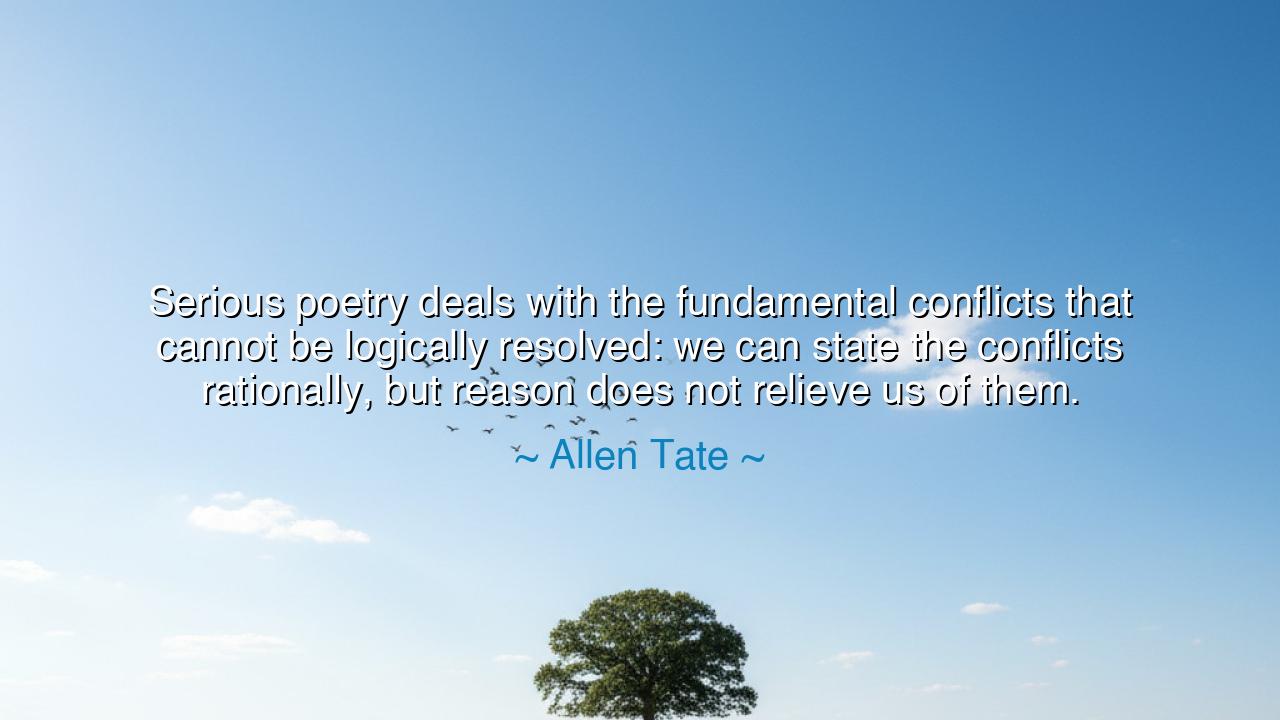
Serious poetry deals with the fundamental conflicts that cannot
Serious poetry deals with the fundamental conflicts that cannot be logically resolved: we can state the conflicts rationally, but reason does not relieve us of them.






Hear the solemn words of Allen Tate, poet and critic of the modern age, who declared: “Serious poetry deals with the fundamental conflicts that cannot be logically resolved: we can state the conflicts rationally, but reason does not relieve us of them.” In this saying lies a revelation of the true task of poetry—not to solve, but to reveal, not to simplify, but to confront the mysteries that reason alone cannot tame. For there are conflicts that live at the very heart of existence, where logic falters and the human soul cries out for expression.
The meaning of Tate’s words is profound. We can name our struggles: the battle between life and death, between love and loss, between freedom and duty, between the yearning for eternity and the certainty of mortality. These can be spoken of in the language of philosophy and science, but the clarity of reason brings no relief. It explains, yet it does not heal. Here is where serious poetry steps forward: it does not erase these conflicts, but gives them form, rhythm, voice, and fire, so that the human heart may endure what the mind cannot reconcile.
The ancients knew this truth well. Consider Sophocles, who in Oedipus Rex showed a man crushed not by ignorance alone, but by the inescapable conflict between fate and freedom. The paradox can be stated: if fate rules, freedom is illusion; if freedom rules, fate cannot bind. Yet no syllogism resolves it. What does Sophocles give us instead? Poetry—tragedy filled with blood, sorrow, and awe, where reason falls silent and the audience is left with catharsis, a purification through tears. Reason cannot relieve the conflict, but poetry allows the soul to endure it.
Think also of the Psalms of David. They are not logical arguments, but cries of anguish and songs of triumph, voices that wrestle with despair, injustice, and divine silence. Rationally, one can state the problem of evil: “If God is good and powerful, why does suffering exist?” Yet the logic does not comfort. Instead, poetry rises: “Though I walk through the valley of the shadow of death, I will fear no evil.” Here is Tate’s meaning embodied—the rational conflict remains unsolved, but the poetic word carries the soul through its fire.
This is why serious poetry endures across centuries. It does not flatter with easy answers, but binds us together in our shared struggle. Dante, Milton, Shakespeare, and Rilke—each gave voice to conflicts reason could name but not resolve. Death remains. Sorrow remains. Longing remains. Yet their poetry grants us strength, beauty, and a sense of meaning that rational formulas cannot provide. Poetry is the vessel through which we carry the unbearable.
The lesson for us is clear: do not despise the unresolvable conflicts of your life. Do not imagine that logic alone will banish them. Instead, give them form, whether through words, music, or art. Speak them, sing them, paint them, pray them. For when you turn your deepest struggles into poetry, you make them bearable, and in making them bearable, you find wisdom.
Practical is this path: when grief comes, write; when confusion grips you, sing; when paradox weighs upon your soul, express it, rather than silence it. Do not wait for reason to solve what is eternal in its tension. Instead, let poetry—whether read or written—be your companion. For as Allen Tate teaches, serious poetry is not the escape from conflict but the embrace of it, the sacred art that transforms pain into beauty, and impossibility into endurance.






TCThithu Cao
I find this quote thought-provoking because it suggests that reason and logic are not always enough to bring resolution to life's deepest questions. It made me think about how often we turn to logic when facing personal or existential challenges, only to feel more confused or distant from the truth. Is there a way to move beyond rational thought and embrace the emotional, irrational aspects of our lives? How do we reconcile those two aspects of our being?
TMTran My
This quote highlights how some of the most intense personal battles don’t have a rational solution. I think about the way we try to ‘solve’ emotions or life’s uncertainties, only to find ourselves back at square one. It makes me ask—can we ever truly resolve the fundamental conflicts in life? Or do we simply learn to navigate them, accepting them as part of the human experience? Could art, especially poetry, help us cope with these unresolvable conflicts?
UGUser Google
I’ve always believed that poetry explores the things we can’t always articulate, and this quote reinforces that. It makes me reflect on how often we use reason to avoid confronting our most profound inner struggles. Is reason always a form of avoidance? Could it be that the very act of ‘solving’ something emotionally robs us of the chance to experience it fully and understand it on a deeper level?
TNThien Ngoc
The idea that serious poetry deals with conflicts that reason cannot resolve reminds me of how some aspects of human nature are beyond explanation. For example, love, grief, and existential questions don't yield neatly to logical answers. I wonder, can we accept that certain things in life are beyond resolution? Or do we, as individuals, constantly strive to make sense of them with reason? Can we learn to live with these unresolved conflicts?
MTTran Minh Truong
I find this quote compelling because it speaks to the human condition—the contradictions that we live with, despite knowing they can't be solved with logic. It makes me ask, is the search for resolution in conflict inherently futile? Does poetry, by confronting these unresolved conflicts, offer us a form of catharsis or a new way to engage with our own contradictions? What role does art play in our understanding of the unresolved?